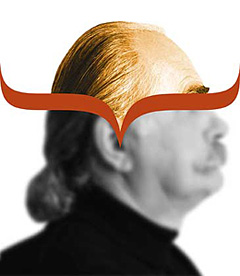 |
 |
 |
 Health & Beauty | December 2006 Health & Beauty | December 2006  
Exercise for Your Aging Brain
 NYTimes NYTimes


| | Neuroscientists advocate exercising the brain by doing what they term "mental aerobics". This can include doing crosswords, learning a new language, or writing with your left hand if you are normally right handed. |
If you’re worried that your mental powers will decline as you age, a new study offers hope that a relatively brief flurry of brain exercises can slow the mind’s deterioration.

The study, whose findings were published last week in the Journal of the American Medical Association, involved 2,800 men and women in six American cities. All were healthy, 65 and older, and living independently. Most participants were given 10 sessions of training to improve a particular mental skill. A memory group learned strategies for remembering word lists and textual material. A reasoning group learned how to find the pattern in a letter or word series. And a third group was trained to identify an object on a computer screen at increasingly brief exposures.

When tested five years later, these participants had less of a decline in the skill they were trained in than did a control group that received no cognitive training. The payoff from mental exercise seemed far greater than we are accustomed to getting for physical exercise — as if 10 workouts at the gym were enough to keep you fit five years later.

Researchers have yet to find compelling evidence that the retention of mental skills significantly improved the ability to tackle everyday tasks, like handling money or following instructions on a medicine bottle. But there are encouraging hints in the data that brain exercises may well help, a critical factor in determining whether elderly Americans can live independently.

If further studies show that mental exercises can improve everyday functioning, doctors may need to prescribe such training, senior centers may want to set up “brain gyms,” and aging Americans would be wise to do brain-stretching activities. For this purpose, even the Medicare prescription drug program, which critics deem too confusing for many older people to navigate, could prove an unexpected blessing. Spend 10 hours mastering its intricacies today and you could be a lot sharper than your compatriots five years from now. | 
 | |
 |



